Why Morocco?
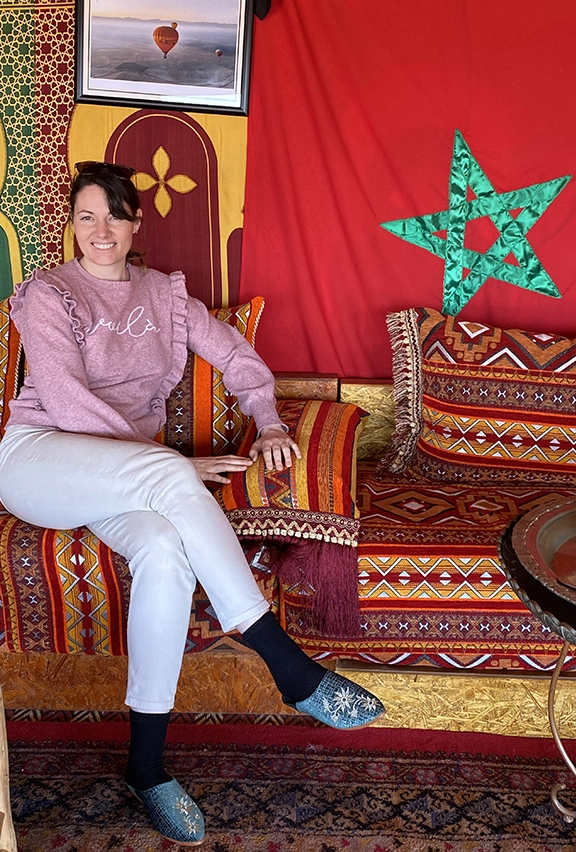
Morocco is a fairly new destination for our groups. I wanted to familiarise myself with it so that I could advise on the best itineraries for each group’s individual needs and budget.
It’s a great destination, especially when combined with a trip to Iceland, so groups can see two countries that are complete opposites, with hot and cold environments.
A tour to Morocco will include many different visits and destinations. Most groups start in the busy and exciting city of Marrakesh, before travelling through the mighty High Atlas and the Anti-Atlas. Many will also continue along the date palmeries of the Drâa Valley before heading into the Sahara at Zagora.
Morocco is most suitable for geography, food technology and halal tours.
On the geography side, students can experience both the physical (fold mountains, earthquakes, river processes and forms, arid landscapes and climate change) and the human side (water resource management (traditional and modern), contrasting cultures (traditional Berber life in the High Atlas and the Marrakesh Plain) and World Heritage Sites).
Many development topics and issues are readily identified and offer meaningful, real-life, live and relevant case study examples, like river basin management, rural development, renewable energy and climate change.
As it’s a Muslim country, Morocco is also the perfect destination for halal school trips, where students can visit a variety of mosques. The food is absolutely amazing and, of course, all halal by default.
And, speaking of food, this is a great choice for food technology groups looking to explore the cuisine of North Africa.
What did we do in Morocco?
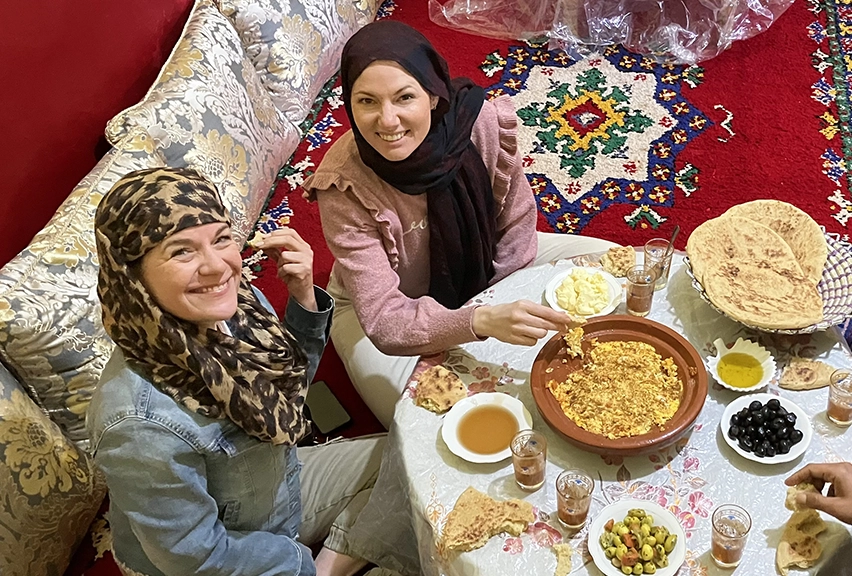
We arrived late in the evening to Marrakesh, so our adventure really started on the second day. We crossed the Marrakesh Plain and drove through the High Atlas, stopping en route for ‘second breakfast’ at a restaurant and an argan oil mini factory shop in the mountains.
We had a delicious Berber omelette with homemade bread and tried the famous Moroccan almond butter, amlou (the almonds are roasted, ground and mixed with honey and argan oil).
After crossing the High Atlas, we stopped to see Aït Benhaddou, which is a grand 11th-century fortified settlement (and now a UNESCO World Heritage Site). Its strategic location once gave it a commanding position on the trans-Saharan trade route between Marrakesh, Ouarzazate and the Sahara.
Many big movies and TV series have been partly filmed here, like Gladiator, Lawrence of Arabia, Jesus of Nazareth, The Jewel of the Nile and Game of Thrones.
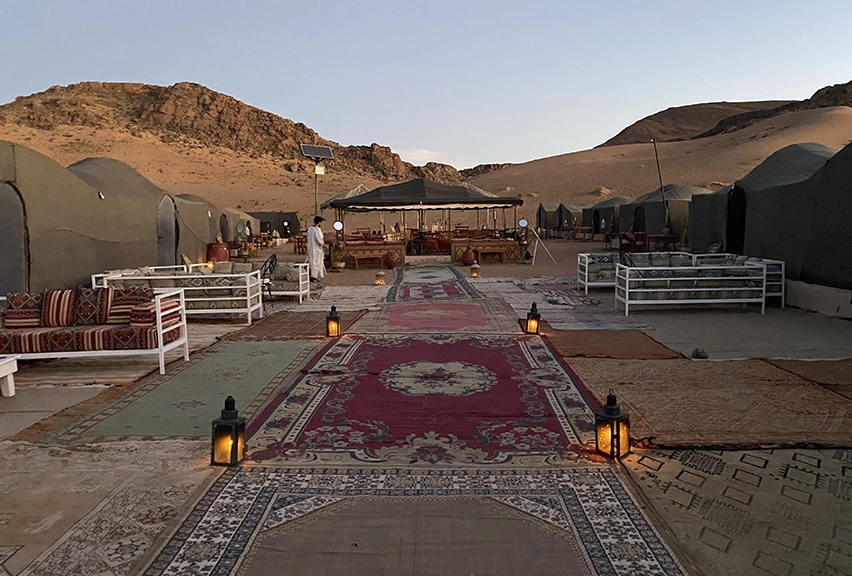
Groups will usually spend the first night in Ouarzazate, but we continued our journey to Zagora, where we took a camel ride to a Bedouin camp. There, we took tea before ascending one of the dunes to view a spectacular Saharan sunset. Later, we enjoyed a traditional tagine for dinner.
The next day, we started by visiting a little village called Tamegroute. It's famous for its ‘subterranean’ homes, where shaded passageways guard against the strong tropical sun.
The village is also known for its unique, rich green pottery glaze. We took a quick visit to the potters’ area that showed the clay being prepared, turned, glazed and finally kiln-fired, before visiting the gift shop.
After the visit, we drove back to Marrakesh, stopping at the Atlas Film Studios on the way. Students can have a guided tour around many of the sets used in the productions of famous movies.
Once we arrived back in Marrakesh, we had a guided visit to the old city (Medina). We started the tour from the Koutubia Mosque, walked through the Jemaa el Fna square and the souks, followed by a visit to a traditional apothecary, before watching the sunset from a cafe terrace on the square.
On our final day, we visited a little village, Douar Oulad Elguern, north of Marrakesh. Here, groups have the chance to spend the day amongst the villagers and participate in the day-to-day village activities, as well as meeting the very warm and welcoming villagers.
The changing climate and years of drought make survival more and more marginal in these little villages. A visit to this village will help students understand why Moroccan youth (especially young men) are being pulled away from their rural villages and pushed towards the greater economic prospects of Marrakesh.
What about the accommodation?
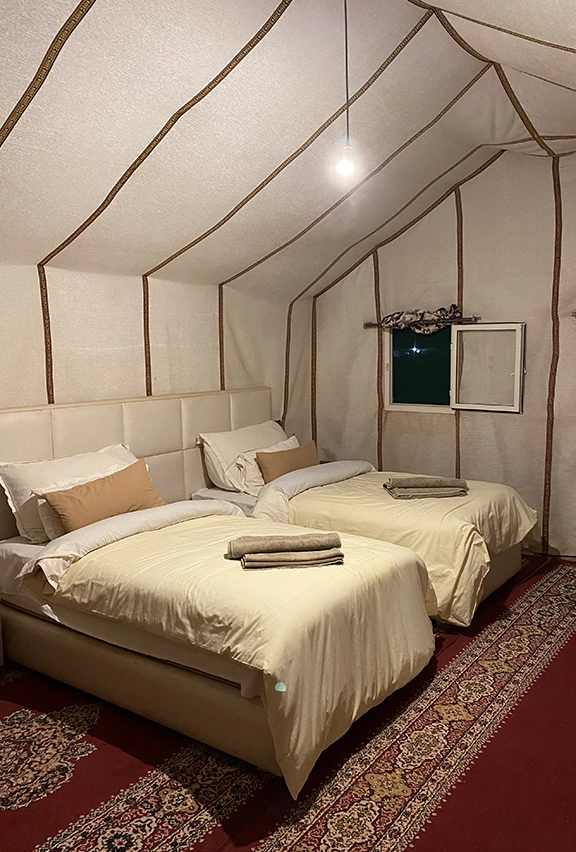
We saw several accommodation options that our groups can stay in in Morocco.
In Marrakesh, we stayed at the Hotel Majorelle, close to the Majorelle Gardens. All rooms are en-suite and students usually stay in twin rooms in this hotel. It’s fairly close to the city centre – in fact, if you stay here, you could walk to the Medina. And if you choose to stay here, dinner and a small buffet breakfast will be included.
We also visited a 4* hotel called Waso in Marrakesh, which is just outside the city. Groups staying here would be able to use a coach to easily access the city centre, making this a great option for those who want to enjoy all the sights and sounds of Marrakesh before escaping the hustle and bustle each night.
In Ouarzazate, we visited the Ibis hotel, which was the highest standard hotel we saw during our time in Morocco. It’s a new building in a quiet area and has a really big dining area and an outdoor pool. Groups would usually stay in singles or twins in this hotel.
We spent our second night in Morocco in a Bedouin camp in the Sahara. There are two camps fairly close to each other and there’s a possibility to have tents with en-suite facilities (if shared just isn’t an option for your group). It’s such a great experience to spend the night in the middle of the desert, I’d definitely recommend it.
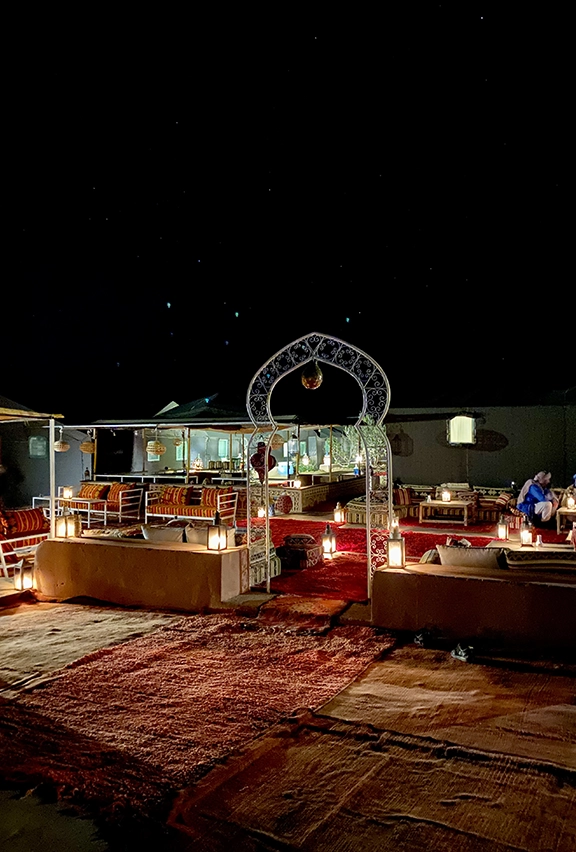
Why should I choose Morocco for my next school trip?
Morocco is a great destination for a school trip because it’s so different from the UK. Students will truly experience a different culture and a totally different climate. They’ll develop their understanding of the issues and daily struggles experienced by the Berbers in small, rural villages.
They’ll have real-life experience of a number of development topics and issues, from the realities of nomadic pastoralism and agriculture within an arid landscape, to climate change and its impact on the people living here. They’ll explore the Berber and Bedouin cultures here too, which really is an unforgettable experience.
And they definitely won't go hungry here, thanks to the incredible food.
Want more information on school trips to Morocco?
Please don’t hesitate to get in touch or give us a call on 0115 9404 303.